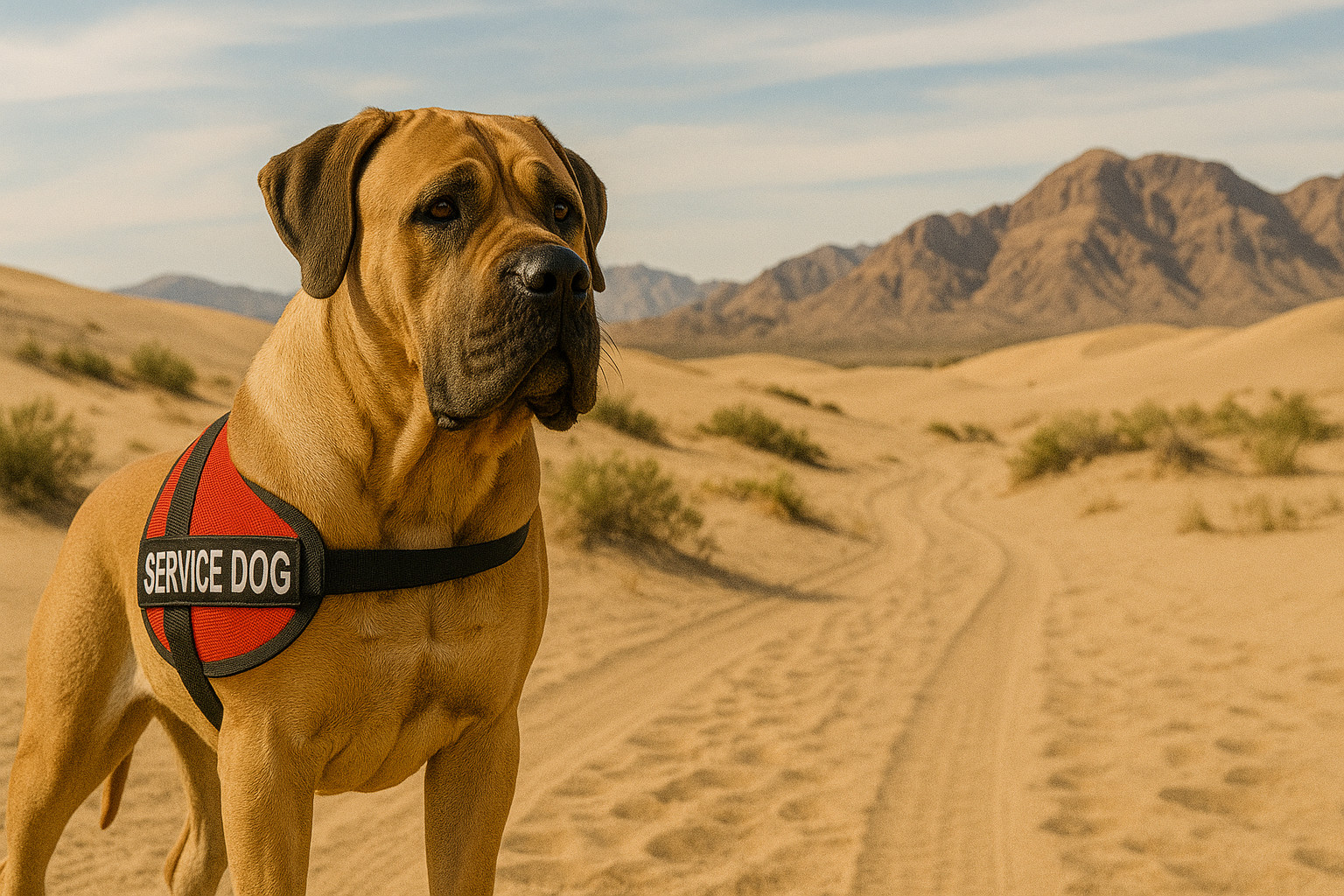Boerboel as a Service Dog

Choosing the appropriate breed for service work is crucial, as each dog's physical and behavioral attributes significantly influence their ability and suitability for various tasks. Boerboels, also known as South African Mastiffs, are an impressive breed renowned for their protective instincts and loyalty. Despite their remarkable traits, when considering them as service dogs, several factors must be evaluated to determine their aptitude for such roles.
Boerboel Overview
Originating from South Africa, Boerboels were developed primarily as working guard dogs. Their primary purposes were to protect homesteads and farms from wild predators and intruders. Over time, they have gained recognition for their impressive strength, unwavering loyalty, and keen instincts, which are essential qualities for specific service dog roles. However, their robust nature and historical background as guard dogs raise questions about their general adaptability for service dog tasks, especially those requiring calmness and social adaptability.
Physical Characteristics
The Boerboel is a large, muscular breed, typically weighing between 110 to 200 pounds and standing around 22 to 27 inches tall at the shoulder. Their substantial size and strength, combined with an agile and athletic build, enable them to perform physically demanding tasks. Their robust physique makes them particularly suitable for mobility assistance work, where strength and stability are imperative. Additionally, their short, dense coat is easy to maintain, which is beneficial in terms of grooming requirements.
- Size and Strength: Ideal for tasks that require stability and support, such as pulling wheelchairs or aiding in mobility for those with physical impairments.
- Agility and Muscle Mass: Allows them to navigate various terrains and environments.
However, their size can also be a disadvantage, especially in environments where space is limited or where unobtrusiveness is desirable, such as in office settings or public transportation.
Temperament and Attitude
The Boerboel possesses a natural protective instinct and a strong territorial drive, traits inherited from their historical role as guardians. While these characteristics make them excellent protectors, they can pose challenges in public or unfamiliar environments.
- Loyalty and Bonding: Boerboels form deep bonds with their handlers, which is a critical trait for service dogs that must be responsive to their owner’s needs.
- Confidence and Assertiveness: These traits make them reliable and determined, but can be misinterpreted as aggressive if not properly managed.
- Alertness and Distractibility: Though attentive, Boerboels require extensive socialization and training to ensure they are not overly reactive to new stimuli, which is essential in environments requiring calmness and composure.
While Boerboels are loyal and smart, their independence and protective nature require experienced handling to ensure they behave appropriately in diverse situations.
Types of Service Work
Due to their physical and behavioral characteristics, Boerboels can excel in certain types of service work, while being less suited for others.
- Mobility Assistance: Their strength makes them ideal candidates for providing physical support to individuals with mobility impairments, including tasks like balance assistance.
- Guard and Protection Services: While not typical service dog roles, their protectiveness can be advantageous in scenarios requiring personal protection.
- Emotion and Stress Recognition: Although they are highly attuned to their handler’s emotions, their imposing presence might not always be perceived as comforting, potentially limiting their effectiveness in psychiatric service roles or as emotional support animals.
Boerboels are less suited for roles requiring frequent human interaction and social engagement due to their instinctive wariness of strangers, such as therapy dogs or guide dogs.
Health Considerations
Being a large breed, the Boerboel is prone to certain health issues that could impact their service work capacity. It is crucial to be aware of these potential health conditions:
- Hip and Elbow Dysplasia: Common in large breeds, these conditions can lead to joint pain and mobility issues, which might limit their effectiveness in physically demanding roles.
- Bloat: A life-threatening condition that affects many large, deep-chested breeds, bloat requires immediate medical attention.
- Heart Conditions: Some Boerboels may inherit cardiac issues, potentially impacting their stamina and ability to perform certain tasks.
Maintaining a healthy weight, routine veterinary check-ups, and attentive care are essential to ensure their well-being and longevity in service roles.
Training and Suitability
Trainability is a critical attribute for any service dog candidate. Boerboels are intelligent and capable learners, but their independent nature can impact training.
- Intelligence and Learning Ability: They are quick learners but require consistent, positive reinforcement techniques to address their independent streak.
- Socialization Needs: Extensive socialization is vital from a young age to mitigate their natural protectiveness, ensuring they can function appropriately in public settings.
- Consistent Handling: They require experienced handlers who can provide firm, fair leadership to establish trust and respect.
Boerboels thrive under training that channels their intelligence and energy into productive tasks. With the right trainer and handler, their loyalty and keenness to work can be harnessed effectively.
Summary of Boerboel
In conclusion, Boerboels possess attributes that can make them suitable for specific service roles, particularly those that require strength and loyalty. However, their natural instincts and potential health issues present challenges that require careful consideration.
- Strengths:
- Strong and robust, ideal for mobility assistance.
- Deeply loyal and bonds well with handlers.
- Weaknesses:
- Potential for health issues, such as joint dysplasia.
- Protective nature may be challenging in social settings.
- Ideal Roles:
- Mobility assistance.
- Roles requiring strength and support.
Evaluating a Boerboel as a service dog necessitates a balance of understanding their unique attributes and addressing their specific needs through proper training and management. With the right approach, they can indeed be effective service companions.











